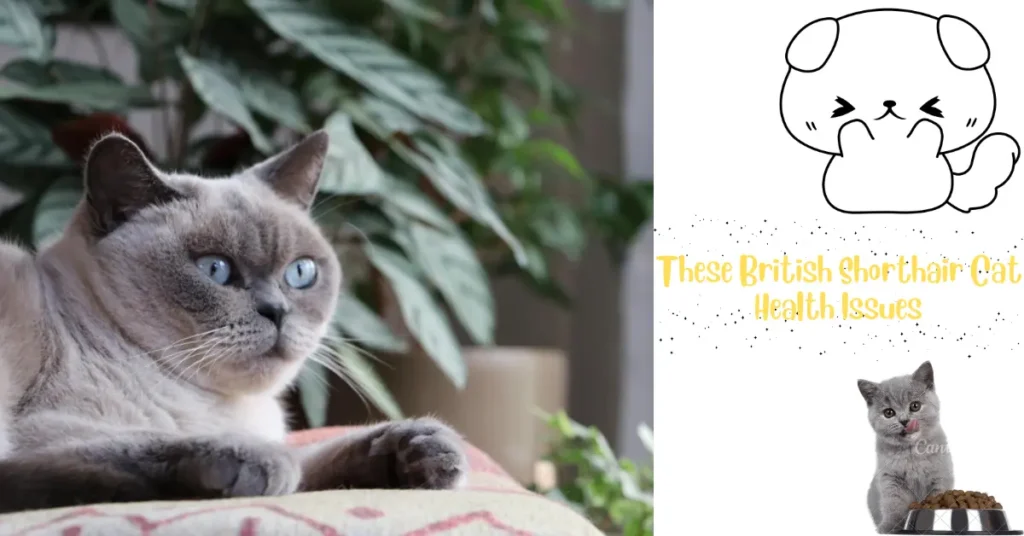
Table of Contents
ToggleIntroduction
Welcome, fellow cat enthusiasts, to a purrfectly informative journey into the world of British Shorthair cat health. Our furry companions rely on us for their well-being, and it’s essential to be aware of potential health issues that might arise. In this comprehensive guide, we’ll delve deep into common British Shorthair cat health problems, learn how to recognize warning signs, and discover ways to ensure our feline friends lead long and healthy lives.
Understanding the Importance of Cat Health
Our British Shorthair cats bring joy, comfort, and companionship into our lives. Ensuring their health is paramount. Just like humans, cats can face various health challenges, and being proactive is key. Let’s embark on this educational journey together.
Common Health Issues
British Shorthair cats, known for their distinctive appearance and charming personalities, are prone to specific health issues. Let’s explore these concerns and understand how to address them effectively.
Obesity: When Fluff Turns to Puff
- The Weighty Issue: British Shorthairs have a tendency to gain weight.
- Why It’s a Problem: Obesity can lead to diabetes, arthritis, and other health problems.
- Feeding Right: Ensure your cat’s diet is appropriate for their age and activity level.
- Exercise Matters: Engage your cat in playtime to keep them active.
Dental Dilemmas: Feline Oral Health
- The Tooth Truth: Dental issues are common among cats.
- Serious Consequences: Dental problems can lead to pain and other health issues.
- Brushing Tips: Learn how to maintain your cat’s oral hygiene.
- Regular Vet Visits: Dental care should be part of routine check-ups.
Genetic Predicaments: Unmasking Hereditary Conditions
- Genetic Predisposition: British Shorthairs can inherit certain health conditions.
- The Role of Genetic Testing: Discovering and addressing potential issues.
- Knowledge is Power: Educate yourself about breed-specific health concerns.
- Early Intervention: Identifying issues before they become severe.
Recognizing Health Warnings
Our cats can’t speak, but they communicate their discomfort or illness in various ways. Paying attention to these cues is essential for early intervention.
Behavioral Red Flags: What Your Cat's Actions Are Saying
- Changes in Behavior: Cats may become lethargic, irritable, or hide when unwell.
- Loss of Appetite: Refusing food or water is a significant concern.
- Litter Box Habits: Pay attention to changes in urination or defecation.
- Excessive Grooming: Cats may over-groom as a response to discomfort.
Physical Cues: Signs of Discomfort or Illness
- Lethargy: A lack of energy or interest in play can indicate a problem.
- Vomiting or Diarrhea: Frequent episodes are a sign to seek vet care.
- Changes in Coat: Dull, matted fur may signal health issues.
- Weight Changes: Sudden weight gain or loss requires attention.
When to Visit the Vet: The Importance of Regular Check-Ups
- Preventive Care: Routine vet visits can catch problems early.
- Vaccinations: Ensure your cat is up-to-date on vaccinations.
- Dental Exams: Regular dental check-ups are crucial.
- Senior Cat Care: Older cats may need more frequent visits.
Prevention and Care
Now that we’ve discussed common health issues and recognizing warning signs, let’s focus on preventive measures and proactive care for your British Shorthair cat.
The Vet's Office: More Than Just Shots
- Choosing the Right Vet: Find a vet you trust and feel comfortable with.
- Vaccinations: Ensure your cat is protected from preventable diseases.
- Regular Check-Ups: Consistency in vet visits is essential.
Cat Cuisine: How Diet Impacts Health
- Balanced Diet: Feed your cat high-quality food appropriate for their age.
- Portion Control: Avoid overfeeding, which can lead to obesity.
- Consult Your Vet: Ask your vet for dietary recommendations.
Exercise Essentials: Keeping Your Kitty Active
- Interactive Play: Engage in play sessions to keep your cat mentally and physically stimulated.
- Toys and Challenges: Provide toys and puzzles for entertainment.
- Scratching Posts: Encourage natural behaviors with scratching posts.
Stress Management: A Happy Cat is a Healthy Cat
- Recognizing Stress: Understand what causes stress in cats.
- Create a Safe Space: Provide hiding spots and quiet areas.
- Routine Matters: Cats thrive on consistency.
Caring for Your British Shorthair Cat
Loving Your Cat: The Best Medicine
- Quality Time: Spend time with your cat, offering affection and companionship.
- Grooming: Regular grooming sessions strengthen your bond.
- Patience and Understanding: Be attuned to your cat’s needs and preferences.
A Final Note on Feline Health
In this extensive guide, we’ve explored the world of British Shorthair cat health issues. Your commitment to your feline companion’s well-being is admirable. By staying informed, recognizing warning signs, and providing preventive care, you’re ensuring a long and healthy life for your beloved cat.
Conclusion
Your British Shorthair cat relies on you for their well-being. By staying informed about potential health issues and taking preventive measures, you can ensure a long and happy life for your feline friend. Remember, a healthy cat is a happy cat. Share this valuable information with fellow cat lovers to help them keep their British Shorthair cats in top-notch condition.
British Shorthair cats typically live for 12 to 20 years when well-cared for.
Yes, regular dental care is essential for preventing oral health issues. Brush your cat’s teeth as part of their grooming routine.
Consult your vet for a tailored weight loss plan that includes portion control, a balanced diet, and increased physical activity.
British Shorthairs may be predisposed to certain hereditary conditions, so regular check-ups and genetic testing are advisable.
It’s recommended to schedule at least one annual check-up with your vet. Senior cats may need more frequent visits.


